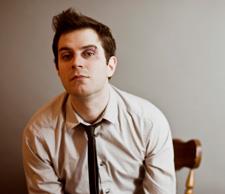In an East London flat, Anita discovers she’s being stalked by Davey, the 17-year-old gay boy who witnessed the brutal murder of her son, Vincent, by a gang of gaybashers. After she invites him in, they try to make sense of the tragic crime.
That’s the hook in the smash hit Vincent River by British playwright Philip Ridley, which will have its Canadian premiere courtesy of Toronto’s Cart/Horse Theatre in February at the Tarragon Extra Space.
Written with bleak yet poetic and imagistic language, the play focuses less on the hate crime at its centre than on the lingering impact it has on the victim’s surviving loved ones.
“I think a lot of playwrights would have written the play about Vincent and the crime,” says Matt Gorman, Cart/Horse’s artistic director and the actor who plays the teenaged Davey. “It would have been big and dramatic and scary, but it wouldn’t have the same lingering effect as it does seeing the effect it has on these characters’ lives.”
Framing the story this way makes the show feel less like an after-school special or morality play, Gorman says.
“When we chose the script, we didn’t set out to put on a show about homophobia and about bullying gay kids, but that’s just what the show is,” he says. “Where I found the writing is so incredible is that it’s just as much about that as it is about grief and loss and first love and overprotective mothers. He’s taken these big issues that another playwright would use to make an agitprop piece that would be popular with university students but no one else and made something very particular.”
Telling the story through the eyes of the victim’s family also gives the audience a way in to the world of the play, says director Stewart Arnott.
“For the older heterosexual audience, [Vincent’s mother] Anita is their conduit to the play,” Arnott says. “For the younger audience, gay or straight, it’s Davey. The audience is going to take away the horror of that act, the great loss of that act. And reflecting on that, they’re going to recognize that this is real in society.”
Mounting this play now seems especially apropos in the wake of the mainstream media attention that has been given to anti-gay violence and to the struggles of queer youth over the past two years, through the It Gets Better campaign, a string of teen gay suicides and, locally, after the October 2009 murder of Chris Skinner.
“Unfortunately, it happens all the time,” Gorman says. “East London is an incredibly dangerous and unforgiving place. It’s that strange thing: when people are down on their luck, they lash out even more at people they see as different.”
Even though homophobia drives so much of the action of the play, the audience is given only indirect glimpses at the effect it has.
“We don’t hear about Davey’s social experience of homophobia directly,” Arnott says. “We get a very clear picture of his relationship with his mother, and that despite him being very close with her, she’s terrified of him being gay and is quite cruel and manipulative of him. Davey’s internalized homophobia is pretty clear in the play. There’s a part of him that’s afraid of being queer.”
Putting this show together was a two-year process for Gorman, who first discovered the script in a second-hand bookstore on Yonge St.
“It was just on the shelf of Eliot’s,” he says. “I read the first page and was hooked.”
After that came a long process of securing funding for the show, which relied largely on collecting private donations.
“It’s incredibly tough. You cry a lot. You cry in front of people, and that helps get money. I really have no pride any more in terms of trying to save face to get money,” Gorman says.
But Gorman says that sacrificing his pride was a fair price to pay for the opportunity to play such a challenging role.
“If this show were being done [by an established company] in Toronto, I wouldn’t be doing it. I wouldn’t be seen for this,” he says. “It’s rare as performers we get to take ownership of the roles we play, and who we get to play with. It’s a great opportunity as an actor to say, This is my work as an actor, to put my stamp on the whole thing.”


 Why you can trust Xtra
Why you can trust Xtra


